




 |
   |
 |
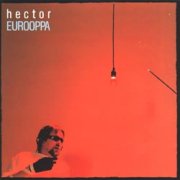 |
Eurooppa (1981, 33.17) ***/TEurooppaVideorodeo Woyzeck Omassa Kotona Vieraantunut Sydänten Kaatopaikka Koira Ja Hänen Miehensä Uni 8? |
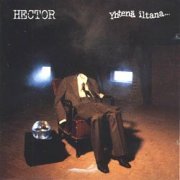 |
Yhtenä Iltana... (1990, 49.12) ***/TT½ |
|
| Yhtenä Iltana Juodaan Viinaa Halvat Pelit Seisovaa Ilmaa Väärät Naamat Näkemiin-Kuulemiin Älä Tee Sitä Amsterdam |
Minä Olin Hotelli Illat Pitenee Markan Valheet Sataako Huomenna, Padam Näin on |
|
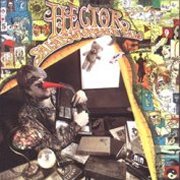 |
Salaisuuksien Talo (1994, 49.39) ***/TT½ |
|
| Viimeinen Unelma Velisurmaaja Tuuleen Magdaleena Joki Tulvii Kaksi Palaa Aameneen Salaisuuksien Talo Oisinpa Tuuli |
Tönkkösuolattu Kansa Joskus Itkee Jokainen Uskotko Ihmeisiin |
|
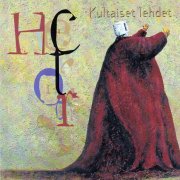 |
Kultaiset Lehdet (1995, 58.15) ***/T |
|
| Yö Tanssittaa Pahuuden Avenue Pää Räjähtää Pian Tuuthan Takaisin (Darling Be Home Soon) Mitä Mulle Kuuluu Kultaiset Lehdet Oi Ystäväin, oi Armahain Kun Kello Pysähtyy |
Time Goes By Nuoruuden Lopetus Aukaisit Oven Vanhat Polkupyörät Halleluja (Hallelujah) |
|
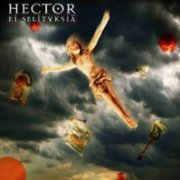 |
Ei Selityksiä (2004, 51.46) ***/TT |
|
| Olishan se Hienoo Stadille Hysteeri Kuunnellaan Vaan Taivasta Ei Selityksiä Saarnaaja Nuorallatanssija Neljä Tuulta |
Juodaan Viinaa Lähes Onnellinen Mies Eki-Setä Tää on se Aamu Kun Rakkaus Saapuu Kaupunkiin |
|
Current availability:
Mellotrons used:
Hector, known to his mum as Heikki Veikko Harma, has been active in the Finnish music biz since his first single in 1965, releasing over twenty albums since his long-playing debut in 1972. I've seen comments like "...influenced by David Bowie", probably referring to his early-'70s work, but his tenth album, 1981's Eurooppa, is a fairly mainstream pop/rock album of its time. All but one of the songs are by the man himself, although Sydänten Kaatopaikka is a Finnish-language cover of Short And Sweet from David Gilmour's magnificent eponymous solo album, carrying on what appears to be a long tradition of Finnish artists covering foreign material with translated lyrics, even if (as this case) the title bears no relation to the original. Mellotron from Finland's No. 1 Mellotronster, Esa Kotilainen (also on MiniMoog, ARP Omni and Oberheim OB-Xa), with choirs on the opening title track and strings on Woyzeck. It's possible there are a couple of other bits hidden away, but nothing obvious.
Hector's next relevant album is 1990's Yhtenä Iltana..., a folkier effort, at least going by the amount of the dreaded accordion to be heard on the record. Again, mostly self-written material and, while Seisovaa Ilmaa is better known as Walk On The Wild Side, I'm sure I don't remember any reference to Helsinki in the original. Kotilainen on Mellotron again, with choirs on the opening title track (again), a brief but lovely flute part on Näkemiin-Kuulemiin and background strings mirroring the Hammond on Älä Tee Sitä. More of those flutes on Illat Pitenee and Markan Valheet and some really quite full-on flutes and strings on Sataako Huomenna, Padam, making this, against the odds, almost worth hearing for its Mellotron input. Four years on and Salaisuuksien Talo carries on in a similar vein, with rather too much accordion for my personal liking, mixed in with rockier numbers. By this point in his career, Hector seems to have settled into a kind of middle-aged singer-songwriter thing, with a rabid following in his home country, partly due to singing in his own language. Kotilainen plays Mellotron again, with flutes and strings on opener Viimeinen Unelma, choir swells on the rockier Velisurmaaja, distant choirs on the beautiful Magdaleena and more flutes on Joki Tulvii. Flutes again on the balladic Oisinpa Tuuli, alongside real strings and flutes, low-end choirs and cellos on Joskus Itkee Jokainen, making for passable Mellotron input once again.
1995's Kultaiset Lehdet reduces the accordion input (hooray!), being at its best on the folky Oi Ystäväin, Oi Armahain, Kun Kello Pysähtyy and Hector's Finnish-language take on Leonard Cohen's Halleluja(h). Kotilainen plays Mellotron flute intervals on Pää Räjähtää and flutes and choirs on Nuoruuden Lopetus. The last of Hector's Mellotron albums (at least to date), Ei Selityksiä, is more of the same, mixing more folk-influenced material with a few uptempo numbers, not least Hysteeri, which sounds a lot like that Ricky Martin hit, but isn't. Four credited Kotilainen Mellotron tracks, with possible strings backing the real string quartet on Kuunnellaan Vaan Taivasta, background flutes and strings on Saarnaaja, possible distant choirs on Nuorallatanssija and more upfront flutes and strings on Eki-Setä, featuring the amusing lyric, "Eki-Setä has left the building".
It's actually hard to know how to rate these albums; they consist largely of mainstream pop/rock for whenever they were recorded, sung in a language spoken by few outside the country. Kudos for sticking to Finnish, although it may not be an entirely altruistic move, as I'm sure it's given Hector extra brownie points at home. Better to be a big fish in a small pond? Anyway, I've given them all three stars as none of them either offended or inspired me and none of them seems particularly better than any of the others. Their Mellotron input varies, although I doubt if any of these are really worth tracking down just to hear some nicely-played Mellotron parts.
See: Esa Kotilainen
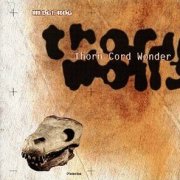 |
Thorn Cord Wonder (1995, 49.05) **½/½ |
|
| Hear No Bullet Heal Weedfire Page 1 (Blank) Coil Zweifel Sleeper Messiah Ferguson |
September Days Exit |
|
Current availability:
Mellotron used:
Trondheim's Hedge Hog were so much a '90s outfit that's it's hardly surprising their career didn't outlast the decade. '95's Thorn Cord Wonder was (to my knowledge) their third of four albums, a game of two sides, one of them passable, punky alt.rock, possibly at its best on the uncharacteristically lengthy Messiah Ferguson, the other not passable, insipid alt.rock, at its worst on Sleeper, 'featuring' Henriette "Di" Hansen's vocal 'talents'.
Producer Lars Lien plays Mellotron, with uncredited flutes on Heal and credited strings on Page 1 (Blank), neither to any great effect, frankly. Is it even real? I can never tell with Lien's productions from the era; some sound like a real machine and some don't. To be honest, in this case, it hardly matters.
Heldon (France) see: |
 |
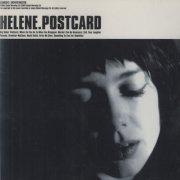 |
Postcard (2003, 59.56) **½/TTT |
|
| Big Talker Postcard Where Do You Go to When You Disappear Murder Can Be Necessary Call Your Laughter Peanuts Brewster McCloud |
Death Rattle Drive Me Slow Something to Live for Downtime |
|
Current availability:
Mellotron used:
Helene Dineen and Graham Gargiulo met in London in the '90s, forming Barefoot Contessa, who released four albums before becoming Helene, apparently to highlight Dineen's voice. The first fruit of their new labours (New Labour! Geddit? Oh, never mind), 2003's Postcard, is a sort of indie/singer-songwriter/post-rock cross, guaranteed to appeal to a certain audience dynamic, albeit not one containing my good self. As with so many similar efforts, the lyrics are almost certainly considered as of at least equal importance as the music, ditto Dineen's fragile, wispy voice which you'll either like or... you won't. The overlong record's material shifts between the duo's various influences, while never fully escaping the '80s/'90s indie aesthetic: good news for some, I'm sure.
Owen Turner plays Mellotron, with strings on all highlighted tracks above, except closer Downtime, which features the flutes. Can I recommend this? Not really, no; I suppose it does what it does perfectly well, but you really have to like what it does and I don't.
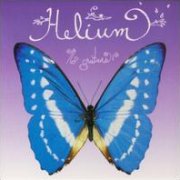 |
No Guitars EP (1997, 19.29) ***/TTTSilver StringsDragon #2 King of Electric Guitars Sunday 13 Bees Riddle of the Chamberlin |
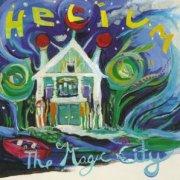 |
The Magic City (1997, 51.32) ***/TTT |
|
| Vibrations Leon's Space Song Ocean of Wine Aging Astronauts Medieval People Lady of the Fire Lullaby of the Moths The Revolution of Hearts Pts I and II |
Ancient Cryme Cosmic Rays Devil's Tear Clementine Blue Rain Soda Walk Away |
|
Current availability:
Chamberlins used:
Helium were a fairly typical '90s indie outfit, in many ways, although their 1997 EP, No Guitars (a lie) is more interesting in places than that would lead you to believe. Although the first three tracks break little new ground, Sunday is a vibraphone/Chamberlin delight, while the near-seven minute Riddle Of The Chamberlin (a song about how cool the Chamberlin is...) moves through several different feels over its length. Plenty of frontwoman Mary Timony's Chamberlin, with often quite high-end cellos on Dragon #2, 13 Bees and (fittingly) Riddle Of The Chamberlin, plus strings on Sunday, usually playing melodic lines rather than chords.
Their subsequent (and last) album, The Magic City, suffers from the same semi-malaise as the EP: a few more interesting tracks (The Revolution Of Hearts, Lady Of The Fire, Blue Rain Soda) versus a surfeit of average indieness. Again, plenty of Timony's Chamberlin work: while it seems a bit high, I think the solo violin line on Leon's Space Song is Chamby, although Andrew Emmett is credited with violin, heard on Lullaby Of The Moths. More of those high-end cellos on Ocean Of Wine, 'regular' strings on Lady Of The Fire and Cosmic Rays, plus what I presume is Chamby brass (and strings) on Clementine.
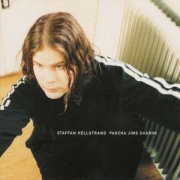 |
Pascha Jims Dagbok [as Staffan Hellstrand Tillsammans Med The Nomads] (1996, 38.55) ***/T½ |
|
| Fanfar En Ny Ida Lupino Precis Som Du Är Blåljus Du Går Aldrig Ensam Ingen Ska Få Andas Marlene Gå Hem |
Vargbanen Pascha Jim Trösta Mej |
|
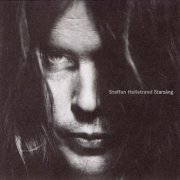 |
Starsång (2001, recorded 1992-2001, 41.18) ***/T |
|
| Vita Hus & Lila Slätter Strålen Har Lämnat Månen Min Änglavän Du & Jag i en Vinterstad Sammet, Rost & Lust Sara-Li Starsång Du Är Så Olik |
Till Linnéa - Via Leonard Cohen Karin Långt Bort Härifrån Hela Min Gata Är Mitt Hem |
|
Current availability:
Mellotrons used:
Staffan Hellstrand (once of Dimmornas Bro) has conducted a successful solo career since the late '80s, 1996's Pascha Jims Dagbok being something like his sixth release. It's a rather unexciting Swedish-language pop/rock album, to be honest, occasionally breaking into hard rock mode (Du Går Aldrig Ensam, Ingen Ska Få Andas), while acoustic closer Trösta Mej is pleasant enough, but there's little here to interest the non-Swedish listener, I'd say. Hellstrand plays what sounds like real Mellotron, with strident strings on Gå Hem, choir and flute mixed in and a flute line on Trösta Mej.
Starsång is your classic 'b-sides/outtakes/unreleased' compilation; although I don't know when individual tracks were recorded, a handful of these must date from the Pascha Jims Dagbok sessions. It's probably at its best on its two ballads, the beautiful Min Änglavän and Sara-Li; otherwise, see my comments above. Hellstrand's credited with Mellotron on the title track, with effected strings running through the piece. Now, I'm not 100% about this, but I'll let it ride for now; assuming I'm right about Pascha Jim, and assuming this track's from those sessions, then it would make sense that it's real. But who knows?
See: Dimmornas Bro
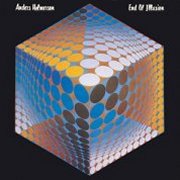 |
End of Illusion (1982, 42.41) ***½/0 |
|
| 7th Heaven Microwar The Fantasies Robot Village String Song Rising Mind Electronical Story End of Illusion |
Missinterpreted Omen Custom Thrill Amnesia Dancing Progressions for Computers Automatic Hammer Digital Anthem |
|
Current availability:
Mellotron used:
Anders Helmerson was a music student in the late '70s, effectively thrown out for expressing an interest in anything written later than 1900. According to the biography on his website, End of Illusion took three years to record and disappeared without trace after a limited release on an unsuitable label in Sweden. It's good without being great, although his keyboard playing is absolutely faultless, Helmerson attacking piano, organ and various mono- and polysynths and, allegedly, Mellotron (stupendous piano work on Automatic Hammer, for example). His influences aren't too hard to spot, with plenty of Emersonian organ work and a UK (the band) feel in places, although there's enough of him in it to rescue it from ignominious Triumvirat territory.
However... Unless my ears are really seriously deceiving me, there isn't a jot of Mellotron on the album. It's credited and may well be hidden away somewhere in the mix, but there aren't even any points at which you think, "Well, maybe there...". Zilch. Nada. Bugger all. So; not a bad album, with some good ensemble playing (plenty of guest musicians) and some fiery keyboard work, but zero Mellotron.
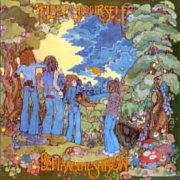 |
Beware the Shadow (1972, 35.25) **½/TAlabama LadyReaffirmation Calapso She's My Girl Molly Bake Bean American Mother Passing Through |
Current availability:
Mellotron used:
Help Yourself were associated with Welsh psychedelicists Man and British pub-rockers Brinsley Schwarz (home to the legendary Nick Lowe, amongst others), so it's hardly surprising that their music had a strong country-rock vein running through it. They made four albums in three years (as bands did back then), the third of which, 1972's Beware the Shadow, is vastly less progressive than its title and sleeve might indicate, being largely pub/country-rock. The exception to this rule is the twelve-minute Reaffirmation, crossing their usual style with a psych/prog aesthetic, which ends up resembling Man, perhaps unsurprisingly.
The album's only Mellotron track (from Malcolm Morley) is, unsurprisingly, Reaffirmation, Morley playing flute, string and brass parts on what sounds (from its reverb, mainly) a lot like a MkII, still often used this early in the '70s. Overall, then, a rather dull effort, although Reaffirmation is possibly worth hearing, as much for the Mellotron as the music.
See: Flying Aces
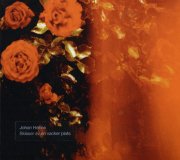 |
Skisser av en Vacker Plats (2005, 46.01) ***/½ |
|
| Untitled Söndag Morgon Snöängel Så Fel Vid Dina Fötter Stockholmskväll Inte Ens ett Undantag |
Sent i Oktober En Dålig Dag |
|
Current availability:
Mellotron used:
Karl Helge Johan Heltne Holmström is a Swedish author and musician, 2005's Skisser av en Vacker Plats being his second release, to my knowledge, although he only lists three later releases on his website. It's a very Nordic-sounding singer-songwriter album, most of its songs somewhat on the mournful side, albeit in a good way, typified by slooooow opener Untitled, complete with its brass section part that's as unlike what you'd expect from that phrase as it could be. Other highlights include piano ballad Stockholmskväll and Sent I Oktober, but fans of dark Scandi-pop are unlikely to be disappointed.
Peter Nylander plays the Crimsonic Studio Mellotron, presumably Pär Lindh's MkV, with nothing obvious on the kind-of upbeat Söndag Morgon (strings buried under the track's real ones?) and a low-in-the-mix arranged flutes part on Sent I Oktober, making this something of a 'don't bother' on the Mellotron front. Incidentally, a big thanks to Hubert for tracking this rarity down for me.
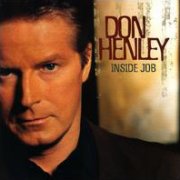 |
Inside Job (2000, 69.58) **½/T |
|
| Nobody Else in the World But You Taking You Home For My Wedding Everything Is Different Now Workin' it Goodbye to a River Inside Job They're Not Here, They're Not Coming |
Damn it Rose Miss Ghost The Genie Annabel My Thanksgiving |
|
Current availability:
Mellotron used:
I would've said Don Henley is best-known for his work with The Eagles, but I'm forgetting his highly successful '80s solo career, although he only actually released three albums that decade. The Eagles reformed in 1994, wittily naming their reformation tour "Hell Freezes Over", after Henley's comment that the band would only reform in the event of that occurrence. Presumably due to his on-off Eagles commitments, Henley's only released one solo album since 1990, 2000's Inside Job, featuring many examples of his usual acerbic songwriting, although musically, it's about as dull as you'd expect, sadly. Maybe justice could be done to these songs via decent interpretations, but I'm afraid to say there's nothing here that lifts any of them out of their deservedly-maligned 'adult contemporary' status. I've given the album the rating I have due to the strength of Henley's actual writing; listening to this album was not what I'd consider an especial pleasure.
Someone, possibly Henley himself, plays Mellotron strings right through the title track, although I'm far from convinced they're real. Given that no-one's even credited for them, why use the sound if you don't even go to the bother of hauling a real one into the studio, though? Ordinary sampled strings, or indeed, real ones, would've done the job just as well on an album as mainstream as this. Anyway, I can't honestly recommend this overlong, bland album on the strength of one possible Mellotron track. I'd quite like to hear its less schmaltzy songs sung by someone who doesn't feel the need to swamp them in syrupy arrangements, though.
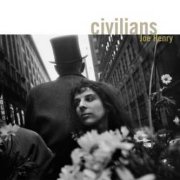 |
Civilians (2007, 57.42) ***½/TT |
|
| Civilians Parker's Mood Civil War Time is a Lion You Can't Fail Me Now Scare Me to Death Our Song Wave |
Love is Enough I Will Write My Book Shut Me Up God Only Knows |
|
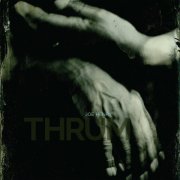 |
Thrum (2017, 55.35) ***½/T½ |
|
| Climb Believer The Dark is Light Enough Blood of the Forgotten Song The World of This Room The Glorious Dead Hungry Quicksilver |
River Floor Now and Never Keep Us in Song |
|
Current availability:
Chamberlins used:
Joe Henry's been making records since the '80s, although it wasn't until 1990 that he made one that apparently doesn't sound like an '80s producer's wet dream. 2007's Civilians is his tenth full-length release, containing twelve tracks of old-school country, more American folk, really, with an unexpected jazz-era sensibility here and there. To be honest, there really aren't any bad tracks here, but highlights include Time Is A Lion (almost sounds like a country ZZ in the guitar department), Scare Me To Death and the lengthyish Our Song. Patrick Warren on Chamberlin, with flutes and strings on the opening title track, flutes on Parker's Mood, strings on Civil War and Wave, plus a major part on Scare Me To Death, making for rather more tape-replay than I'd expected.
Ten years on, Thrum is, effectively, more of the same, probably at its best on opener Climb and The Dark Is Light Enough, although, if I have a criticism, the album is both slightly too long and rather too one-paced, which isn't to denigrate its contents. Warren on Chamby again, with a male voice part on Hungry and a flute line on River Floor, dipping a semitone below the instrument's range, clearly involving some pitchwheel chicanery. Americana fans looking for something a little left-field should leap at these albums, their tape-replay work only enhancing what are already very listenable records. Worth the effort.
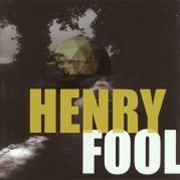 |
Henry Fool (2001, 51.43) ****½/TTT |
|
| Friday Brown Bass Pig Poppy Q Lateshow Midnight Days Blindman One Poppy Z Blindman Two Grounded |
The Laughter That Turned to Ice Jazz Monkey Judy on the Brink The David Warner Wish List Heartattack The Mellow Moods of Malcolm McDowell Dreamer's Song Tuesday Weld |
|
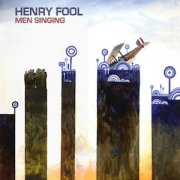 |
Men Singing (2013, 40.29) ****/TTTEveryone in SwedenMan Singing My Favourite Zombie Dream Chic Hippo |
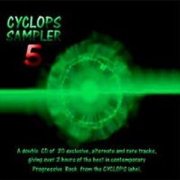 |
Cyclops Sampler 5 (2002) ***½/T½[Henry Fool contribute]Pills in the Afternoon |
Current availability:
Mellotrons used:
Henry Fool are that rarest of things, a contemporary UK progressive act who don't want to be Marillion or It Bites. At long bloody last. Put together by No-Man mainman Tim Bowness, they mix various influences together, coming on like a sort of Floyd/Radiohead thing with extra added ambient textures. Thankfully, Henry Fool is a million miles away from the whole British neo-prog thing and is all the better for it, being probably the most 'out there' release on Malcolm Parker's Cyclops label, although it's unlikely to upset either your dinner party guests or your prog mates (in the unlikely event of your having both). It's also an album that's ping-ponged between this page and the 'Samples' section, eventually finding its way back here again, for reasons detailed below.
The compositions ebb and flow, picking up speed here and there, particularly during the epic Lateshow, or the freeform jamming of The David Warner Wish List, though tending towards the mellow end of the spectrum. There's an almost late-night jazz feel to it in places, though that's not to say it's actually jazzy. Er, it's slightly difficult to describe, really... Stephen Bennett's Mellotron playing abounds (with a little help from Bowness), with much strings and bits of flute and choir here and there; I'm reliably informed that it's a mixture of real and Roland JV1080 samples, presumably due to the contents of the real one's tape frame. Poppy Q would be especially recommended on the Mellotron front, except for the minor problem that the strings hold for far too long to be genuine, but Grounded (from Lateshow) and the major string part on Bass Pig are definite recommendations. Some of the Mellotronic textures here are just a little too smooth, giving their origin away, but it's nice to be able to confirm that at least some of it's the Real Deal.
Well, it's taken Henry Fool twelve years to follow up their debut, 2013's ironically-titled Men Singing being a very different release. Multiple short tracks? Gone. Vocals? Gone. Radiohead influence? Long gone. Instead, we get four long instrumental tracks in a proggy jazz fusion vein, every bit as good as anything else I've heard in the (admittedly limited) field recently and probably better than most. Highlights? For this listener, the fat Moog Taurus all over opener Everyone In Sweden and closer Chic Hippo, the nearest the album gets to 'prog'. Jarrod Gosling (I Monster, Skywatchers) plays his own M400, although some Vintage Key samples were apparently recorded before his arrival. Anyway, we get an upfront string part and (sampled?) flutes on Everyone In Sweden and strings and choirs on the title track, the shorter My Favourite Zombie Dream and Chic Hippo, featuring particularly overt choirs.
See: Cyclops Samplers | Tim Bowness | Galasphere 347
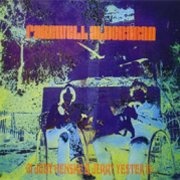 |
Farewell Aldebaran (1969, 34.47) ***½/T½ |
|
| Snowblind Horses on a Stick Lullaby St. Nicholas Hall Three Ravens Raider Mrs. Connor Rapture |
Charity Farewell Aldebaran |
|
Current availability:
Chamberlin used:
Vocalist Judy Henske married folkie Jerry Yester of the Modern Folk Quartet and later of the Lovin' Spoonful, in the early '60s, making the one-off Farewell Aldebaran in California at the end of the decade. Almost inevitably released on Frank Zappa's Straight imprint, it's almost impossible to categorise, although 'folk/psych' will probably have to do for now. Every track is essentially a different style, from the pseudo-sea shanty Raider through St. Nicholas Hall's satirical take on the Anglican hymnbook to the more straightforward folk-rock of Charity. Sadly, nobody much bought it at the time, probably due to its eclecticism.
The reason this album's here is a couple of tracks featuring the Chamberlin. St. Nicholas Hall opens with a female voice that fools the listener into thinking it's real for a moment, until a pitch change alerts you to its keyboard origin. The male voices appear later (is this a keyboard split, or two sounds overdubbed?), making for one of the clearest recordings of the sound I've ever heard. More of the same, but less so, on the closing title track, along with some fantastic early Moog modular (belonging to Bernie Krause of Beaver & Krause, apparently), including an emulation of a vocoder, before such things actually existed.
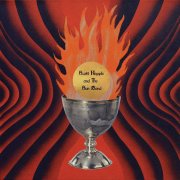 |
Lammas (2024, 30.06) ***½/TTJunctionSun and Moon Lammas The Flame Friend of Mine Killing Days Adoration (Long Kiss) The Bridge |
Current availability:
Mellotron used:
Newcastle quartet Scott Hepple & the Sun Band describe themselves as '60's/70's tinged psych/garage rock from the UK', to which I'd add 'with more than a soupçon of current indie'. Their second album, 2024's Lammas (a supposedly Christian festival, amusingly co-opted by pagans), is a brief-yet-varied run through their various influences, shifting between opener Junction's psychedelia, the aggressive Sun And Moon, the acoustic-yet-anything-but-gentle title track, The Flame's ramshackle indie and closer The Bridge's psych-into-punk, amongst other genre mashups. Highlights? Probably Junction and Adoration (Long Kiss)'s prog moves.
Scott and partner/bassist Sophie Keith visited my studio in '23 and added Mellotron parts to several tracks: a flute line and the odd string note (possibly) on Junction, a string line on The Flame, out of tune strings on Adoration (Long Kiss) and a major flute part on The Bridge. You know when you listen to an album 'featuring' modern Mellotron samples and they're super-smooth, perfectly in tune and, well, a bit bland? Well, this isn't that album. The Mellotron's not merely obviously real, but also obviously out of tune in places. I was kind of supervising the session; how did I let that one go? Perhaps it's the effect they wanted. Anyway, an album for Sun Dial fans who just can't get enough lo-fi indie psych.
 |
Manifestation (2016, 48.06) ****/TTT |
|
| Manifestation part two Gridlock Baba Yaga Manifestation part one Saddha Nocturne Dybbuk Time and Again |
Shatterpoint Waterfalls and Black Rainbows |
|
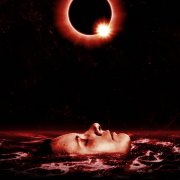 |
Drone Priest (2017, 51.58) ***½/TT |
|
| Fragments of a Portrait Cosmos Drone Priest Slow Current Orphan Filament Count to 5 Zero Point Flow |
Soft Glow Almost Transparent Blue The Blood Jet is Poetry |
|
 |
Hallow (2018, recorded 2013-18, 52.57) ***/½Manifestation part 2Ravenwood Slow Current The Secret of Fire Torture Garden |
 |
Incantation (2019, 50.09) ***½/T |
|
| Sun Gun Incantation One Coin Locker Babies Prey 4 Winter Myth and Ritual Abaddon Pavement Grey |
Temples Incantation Two Torture Garden |
|
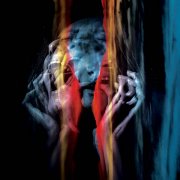 |
Unravel (2020, recorded 2011-20, 43.50) ***½/TConjureAlice Krige parts 1 & 2 Torso National Anthem Unravel Furnace The Plot |
Current availability:
Mellotrons used:
All-instrumental Texans Herd of Instinct, led by Warr guitarist Mark Cook, not only sound a lot like Djam Karet (and feature Djamist Gayle Ellett), but release their albums on their label, Firepool Records. After two albums of Mellotron sample use, 2016's Manifestation's Karet/Crimson moves can be heard to their best advantage on Baba Yaga, Manifestation Part One, Saddha (featuring a spoken-word quote from Kafka's Metamorphosis) and Dybbuk, perhaps. No fewer than three Mellotron players, Cook, Micke McGary and Ellett, with occasional strings on Manifestation Part Two, more upfront ones on Baba Yaga and Manifestation Part One, choirs on Saddha, choirs and octave strings on Dybbuk, strings and flutes on Shatterpoint and choirs and strings on Waterfalls And Black Rainbows, although some of the album's choir sounds aren't especially Mellotronic.
2017's Drone Priest marks a progression for the band, or at least, a change, heading into (slightly) jazzier realms on Count To 5, the Discipline-esque Soft Glow and Ellett's credited 'morse code' on closer The Blood Jet Is Poetry, although Bob Fisher's sax on Almost Transparent Blue works less well to my ears. Mellotron on roughly half of the album, with strings and flutes on Cosmos from Ellett, polyphonic flutes on Slow Current and strings on Orphan from Cook, Ellett's and Adam Holzman's strings and choirs on Count To 5 and flutes on Soft Glow from Ellett, although Cook's octave strings on The Blood Jet Is Poetry don't sound especially Mellotronic.
2018's Hallow is that rarity in the progressive world, a remix album, not (you may be glad to hear) in a dance context, more in one of drifting ambience. Four of its five tracks hail from their three previous albums, but you'd have to know those far better than myself to spot any obvious resemblance, all four stretched out to anything up to several times their original length, all interchangeable massed sustained guitars and keyboard pads. Any highlights? Perhaps The Secret Of Fire (from Conjure) and the one new track, closer Torture Garden. Mellotron? Cook's and Ellett's work may well be on Manifestation Part 2 and Slow Current (the other two credits being samples from Conjure), but the occasional pseudo-strings and flutes could be anything, really.
2019's Incantation loses Drone Priest's vague jazziness, top tracks including Incantation One, the Stick-heavy Prey 4 Winter, Temples (very Crimso) and Incantation Two, while Torture Garden turns up again, this time as a regular piece. Four credited Mellotron players this time round, although what Ellett might be doing on opener Sun Gun and Holzman on Incantation One is unknown, the only obvious keyboard parts being generic sampled strings. Cook adds minimalist choirs to Coin Locker Babies, leaving Rick Read's strings on Prey 4 Winter and Cook's (?) uncredited strings on Myth And Ritual as the album's only Mellotron work of any real substance.
I'm not quite sure what to make of 2020's Unravel. Several new pieces vie for attention with Conjure, which isn't from the album of the same name, the ten-minute Alice Krige Parts 1 & 2, which is, if you get my drift and Furnace, from 2011, although the band's Bandcamp page is a bit vague on when two of the seven tracks were recorded. Highlights? Alice Krige, Unravel itself and Furnace (why has this remained unreleased for so long?), while I wouldn't have known National Anthem was a Radiohead cover had they not told me. Just Ellett on Mellotron, with occasional strings on opener Conjure, strings and flutes on Torso, brass on the title track and more occasional strings on closer The Plot, although, frankly, none of it sounds super-authentic to my ears. Anyway, Herd of Instinct do what they do with aplomb, but Manifestation is the only one of these worth the effort for Mellotron spotters.
See: Samples etc. | Djam Karet
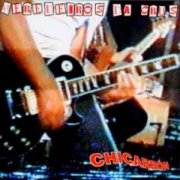 |
Chicarrón (2004, 41.34) **½/T |
|
| A Barraca Chapapote Fresh J. Bar-Dem (Stones Show) Radio Cotilla Profesora Pam O Miniño Vira Tinto Cansión Triste Mama (Nesesito Unha Reseta) |
Os Sinco Latinos No Aire Mari-Juana Geografía |
|
Current availability:
Mellotron used:
Despite being generally regarded as 'rock'n'roll' or 'classic rock', Galician outfit Heredeiros da Crus sound more like the epitome of 'indie rock' to my ears, at least on their last album before their split, 2004's Chicarrón. It has its moments, not least the Police-ish Chapapote Fresh, the lengthy Mama (Nesesito Unha Reseta) and closer Geografía, but it's not the most exciting thing you'll hear this (or any other) year.
Juan de Dios plays Mellotron flutes all over Mama (Nesesito Unha Reseta), sounding surprisingly real, key-click and all, which is about the most encouraging thing I can think of to say about this rather ordinary record.
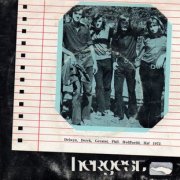 |
Hergest (1973, 13.36) ***/TDewch i'r LlysoeddCan Elgan O'n Hamgylch Nos da i Chi Gymry |
Current availability:
Mellotron used:
Hergest were (and still are?) a Welsh-language folk outfit from the west coast of that region, who debuted with their eponymous 1973 EP, an acceptable, if rather unexciting set of songs, their lyrics incomprehensible to non-Welsh speakers, of course. Three of its four tracks fit the above description, although the piano-driven O'n Hamgylch does the band few favours, frankly.
Delwyn Davies plays Mellotron, with a pleasant strings part on Nos Da I Chi Gymry, presumably meant to approximate real ones. All four tracks of the EP open 2010's Y Llyfr Coch compilation on their long-term label Sain, should you wish to hear more of their output.
 |
Talisman (2011, 51.04) **½/T½ |
|
| A New You Toy of Glass Longing Divebomb Angerholic Shame on Us On a Search Awake |
Cages Dancer Stick Faith in Truth Butterfly |
|
Current availability:
Mellotron used:
Heidi Herløw was a runner-up in the 2008 Danish X-Factor; not exactly world-beating, you might think? You'd be right, but the sales of that year's AudioBallerina were good enough for Playground to sign her up for 2011's Talisman. It's... an X-Factor runner-up's album, all mainstream pop/rock (although at least The Curse Of Autotune doesn't seem to be present). She has the kind of voice that people seem to love, although I'll admit to an involuntary wince at some of the high notes. Not really my style... Top tracks? Maybe Angerholic, sensibly chosen as the lead-off single.
No fewer than three Mellotron players: Tim Christensen (that'll be his machine(s) we're hearing), Daniel Fridell and Mogens Palsbøll, with background strings on Toy Of Glass, more upfront ones on Divebomb and flutes and strings on Angerholic, although all other string parts sound real. Is there more hidden in the mix? Who knows? Hardly the most exciting thing you'll hear all year, anyway.
See: Tim Christensen
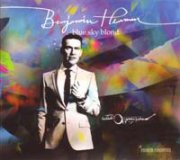 |
Blue Sky Blond (2009, 44.40) ***½/T |
|
| Durban Poison Chasing The Dragon Airhead Indian Hay Black Mote Wired Sunday Blossom |
Ketama Haze Lowryder Skunkaholic Khat |
|
Current availability:
Mellotron used:
Unlike New Cool Collective leader Benjamin Herman's previous release, Hypochristmastreefuzz, there's nothing jazzily reverential about Blue Sky Blond's acid jazz, full of roaring guitar work and hyper-funky rhythms. Hey, jazz for people who don't like jazz! Best tracks? Super-funky opener Durban Poison, Sunday Blossom and Khat, amongst other goodies.
Willem Friede is credited with Mellotron, as on Herman's sample albums, but this time, so is Paul Weller, so my guess is that Friede plays sampled flutes, while Weller adds genuine strings to Indian Hay (over those flutes) and Black Mote. This is a world away from yer 'typical' jazz release and all the better for it, a couple of Mellotron tracks coming as a bonus.
See: Samples etc. | Paul Weller
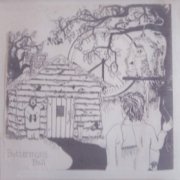 |
Butterman's Ball (1975, 37.39) ***½/TTT |
|
| Graduation Song Nighttime Buttermans Ball Leaving Jon Why You Left Me Never Ending Song of Love Street Night Shift Blues |
A Reflection to You Comin' Back for More Visions of Reality Peaceful Easy Feeling |
|
Current availability:
Mellotron used:
James Hersch has had a lengthy, if low-key career, releasing at least fifteen albums over a forty-something-year period, including children's music, worship songs and a pair of cassette-only releases in the '80s, although Tim Miller seems rather more obscure. The duo's lone album, 1975's Butterman's Ball, is a very pleasant, acoustic singer-songwriter record of its era, highlights including Nighttime, Leaving Jon and Comin' Back For More, while their take on The Eagles' Peaceful Easy Feeling fits the overall mood, whatever you may think of the song.
Hersch plays Mellotron, with 'string section replacement' strings on Nighttime and A Reflection To You, a flute line on the title track, strings and flutes on Leaving Jon and Visions Of Reality and strings under solo violin on Why You Left Me, making for a surprisingly Mellotron-heavy release. I've no idea where this was recorded, but I suspect a studio M400. Although this has never been on CD and isn't on Hersch's Bandcamp page, it's YouTube to the rescue, once again.
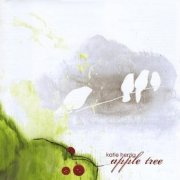 |
Apple Tree (2008, 44.54) **/T½ |
|
| Songbird I Want to Belong to You Hologram How the West Was Won Wish You Well Sumatra I Will Follow I Hurt Too |
Gypsy Girl Shovel Forevermore Take it to the Country Waiting for My Night |
|
Current availability:
Mellotron used:
Despite hailing from Nashville, Katie Herzig has little in common with the C&W hegemony, being more of a poppy singer-songwriter than anything, of the kind whose music is used on US TV shows such as Grey's Anatomy. 2008's Apple Tree is her third album, a dull-but-not-actually-offensive effort, better tracks tending to be the quieter ones, like Gypsy Girl and closer Waiting For My Night, but that shouldn't be taken as a recommendation.
Ben Shive plays Mellotron, with flutes and strings on I Want To Belong To You and strings on How The West Was Won, complete with authentic wobble near the end, although all other string parts sound real to my ears. All rather unexciting, then; harmless enough, which I'm well aware is damning with faint praise, while two reasonable Mellotron tracks is far too few to make this worth hearing on those grounds alone.
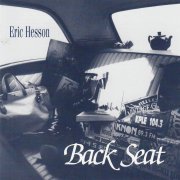 |
Back Seat (2001, 42.09) ***½/T½ |
|
| Back Seat Flaming June Terms and Conditions Observation Accusation Decision An Open Letter It's All for You |
I'm in Love With You We Can't Talk |
|
Current availability:
Mellotron used:
Texan Eric Hesson has made at least two albums, 2001's Back Seat being the second, an excellent, slightly quirky powerpop record with a slight (and, as you'll see, appropriate) XTC bent. Well, I say 'powerpop', but don't go expecting a Jellyfish clone, although I'm quite sure they're in Hesson's influence box. Top tracks? The woozy Flaming June, Decision and An Open Letter, perhaps, while 'top quirky feature' award goes to the wonderfully out-of-tune brass on It's All For You.
XTC's Dave Gregory plays his Mellotron on two tracks, with strings all over Flaming June (and a couple of flute chords at the end) and even more upfront ones on Observation, although Eric Vandergriff's 'fluteandcellotron' on Terms And Conditions is Eric's little 'spot the sample use' joke. Major thanks, incidentally, to Eric for sending me a copy of this, twenty years after its release, not to mention the lovely Mellotron poem he wrote on the packaging. No, I have no idea what my postman thought.
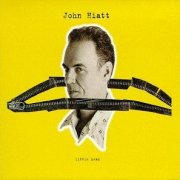 |
Little Head (1997, 42.59) ***/T |
|
| Little Head Pirate Radio My Sweet Girl Feelin' Again Graduated Sure Pinocchio Runaway Woman Sawed in Half |
Far as We Go After All This Time |
|
Current availability:
Chamberlin used:
John Hiatt sold his first song while still in his teens (to Three Dog Night), but didn't achieve any real solo success until the new wave era, when he was dubbed 'the American Elvis Costello', not breaking through properly until his mid-thirties. 1997's Little Head is his fourteenth album, notable for its wry observation of male sexuality on its title track: "I'm just so easily led when the little head does the thinkin'", one of the album's best tracks, along with Graduated, Sure Pinocchio and the vaguely Richard Thompson-esque Woman Sawed In Half.
Jon Brion plays Chamberlin, with cellos on Feelin' Again and flutes on Runaway, but it's not what you'd call one of the album's defining features. Hiatt tends to appeal to middle-aged guys who like a bit of blues and soul with their rock, all served up with good, memorable songs, which is exactly what you get here. Strangely, the album was regarded as a bit of a flop, but anyone who likes Mark Knopfler solo albums should give this a try to see where Knopfler gets his moves.